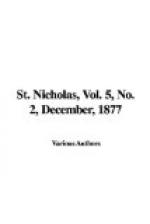The monkey didn’t walk, but was carried in a bucket by a mountaineer, and he blew peas through a tube at the palace steward who was having his hair combed by the court barber. It was so late that the barber had to hurry, and so he used a rake instead of a comb. The steward did not like this, but there was so little time that nothing else could be done, for the procession was already moving.
[Illustration]
There was a lion who lived at the Town-hall. He was very wise, and his business was to bite criminals. When he heard about the bee he thought he would have to go, but the moment he showed himself in the street all the relatives of the criminals got after him. The wasps stung him, a game-cock pecked at him, a beetle nipped him, a dog barked at him, an old woman ran after him with a broom, a wooden-legged soldier pursued him with a sword, a rat gave chase to him, while a rabbit took down his shot-gun and cried out, fiercely, that he would blow the top of that old lion’s head off, if he could only get a fair crack at him.
[Illustration]
Two of the liveliest animals in the town were the donkey and the old cow. They went to the bee, but they danced along as if they didn’t care at all whether they spelled cat with a c or a k. They each had two partners. The donkey had two regular danseuses, but the cow had to content herself with the court librarian and the apothecary.
[Illustration]
Out in the green grass where the company assembled there were a lot of grasshoppers and little gnats. The grasshoppers said to each other, “We can’t put letters together to make words, so let us dance for a spell,” which they did,—all but one poor young creature who had no partner, and who sat sorrowfully on one side, while the others skipped gayly about.
[Illustration]
As soon as the people and the chickens and donkeys and wasps and cows and all the others were seated, side by side, in two long rows, the magician gave out the first word. It was “Roe-dough-mon-taide”—at least that was the way he pronounced it. The king and the queen were at the heads of the two lines, and it was their duty to begin,—first the king, and then the queen, if he missed.
But neither of them had ever heard of the word, and so they didn’t try. Then one of the wasps tried, and afterward a ram, a rabbit, and the head ninny-hammer; but they made sad work of it. Then each one of the company made an effort and did his, her or its very best, but it was of no use; they could not spell the word.
Uprose then the little chicken that had stood on his mother’s back and tried to crow in tune with his father, and he cried out: “Give it up!”
“Wrong!” said the magician. “That’s not it. You are all now under the influence of a powerful spell. Here you will remain until some one can correctly answer my question.”
They are all there yet. How long would you, my reader, have to sit on the grass before you could spell that word?




